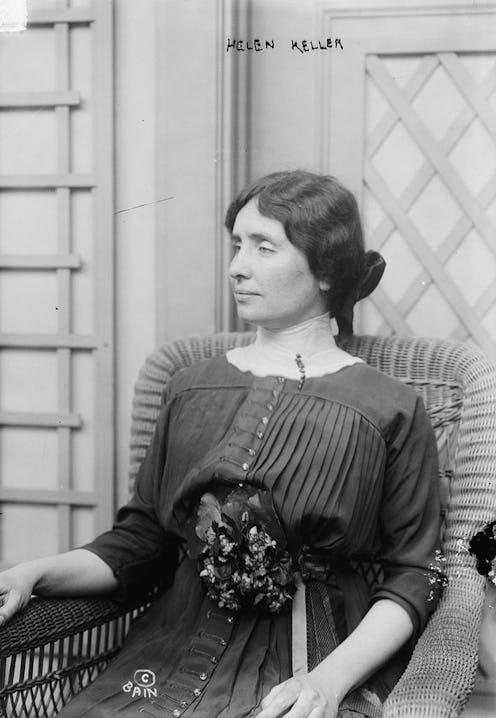Life
7 Feminist Facts You Should Have Learned In School

Sometimes history is much cooler than it seems on paper. Historical figures loom large, crammed with dates, figures and notable achievements, and it can be difficult to visualize them as real people, with genuine senses of struggle and temperaments of their own. But it's important to remember that history happened to real people — particularly when, in the case of notable and powerful women, they do some seriously amazing sh*t that demonstrates their colossal strength of will. Unfortunately, because there's so much bone-dry fact-and-figure history to cram in, high schoolers can lose perspective on the amazing women of history — so here are some facts to demonstrate just how awesome they were.
Calling many of these women "feminists" may not make much sense, because they themselves either never knew the term or didn't own it for themselves — but the role of seriously powerful, butt-kicking women in the history of women's rights is not a small one. It's not all about activism; feminism's history is also composed of women simply going for what they want, regardless of society's constraints. Even if, as in these cases, they had to go to simply amazing lengths to get it.
So here are seven feminist facts you should definitely have learned in school. You may have heard of the names, but did you get a full sense of their badassery? Thought not.
1. Joan Of Arc Told Off Basically Everybody
The depiction of Joan of Arc as an innocent French maiden who was inspired by heavenly visions to lead an army belies just how practical and driven you'd have to be to achieve anything of the sort. Joan herself had a formidable character and did not suffer fools. Transcripts of her church trial indicate that she was capable of extremely sassy and no-nonsense responses; according to Jennie Cohen at the History Channel, she talked smack to everybody from the English to the people interrogating her. It's no wonder they viewed her as such a threat.
2. Cleopatra Authored A Medical Treatise
We mostly know Cleopatra as the lover of famous men, Marc Antony and Julius Caesar, but that's wildly unfair. Cleopatra herself was an immensely powerful ruler who found time for dalliances with handsome Romans in between lording over an immense territory — and writing a book. She wrote a medical treatise called Cosmetics on various medical topics, including a recipe that uses flies to treat baldness.
3. Eleanor Of Aquitaine Crossed The Pyrenees At Age 79
Eleanor of Aquitaine was one of the most powerful women in medieval Europe — and probably one of the most powerful in history. She married Louis VI of France, bore Richard the Lionheart in England, and was famously cultured, witty, and a wily political operator. She was also a massive hardass. It's well-documented that she rode on horseback over the famously treacherous Pyrenees to fetch her granddaughter Blanche and put her in a dynasty-uniting marriage — at the age of 79.
4. Florence Nightingale Wrote Epic Essays About Women's Role In Society
Nightingale wasn't just the founder of modern nursing; she was a defiant champion of women's rights to pursue careers even if they hadn't been expected to do anything of the kind. Like, say, her. She came from very wealthy stock, and her insistence on being a nurse met with years of resistance from her family — an experience that led her to write essays like "Cassandra". She can't be put wholly into a normal feminist mould (she thought suffrage was important but not a priority, for example), but she was mightily against how Victorian society repressed and confined women, essentially all their lives.
5. Queen Victoria Narrowly Escaped Control By Her Mother's Secretary
Queen Victoria, until this week England's longest-serving monarch, had an unusual upbringing, to say the least. The sole heir to the throne, she was brought up by her mother and her mother's comptroller, Sir John Conroy, who deployed a childcare method called the Kensington System that was meant to keep her as their puppet when she assumed the throne. Victoria, however, refused to sign an order that would have made her mother regent (and Conroy the power behind the throne), even while violently sick with typhoid fever. Had she been less strong-willed, Western history could have looked very different.
6. Helen Keller Visited 39 Different Countries
Helen Keller was a woman of firsts: the first deaf blind person to graduate college, the first to write a book (and she wrote several) — but she was also undoubtedly the first to travel to 39 different countries around the world. Keller's odyssey took place over the 1940s and '50s, as she attempted to rally governments to create schools for the deaf and blind. She had to be accompanied on her trips, but became such a favorite with the Japanese people that she returned to the country several times.
7. Marie Curie Went To An Illegal University
Though we mostly know of her as the distinguished genius who won two Nobel Prizes, Marie Curie's early life and pursuit of her passion for science was not entirely smooth. She was born and raised in Poland, which was at that time under the control of Tsarist Russia, and could only obtain university-level education by attending what was called "The Floating University" — an illegal, secret night school that catered to Polish students and hoped to foster a Polish liberation movement among the young. Attending was a dangerous decision, and when Curie eventually escaped to study in France, she spoke no French. Fortunately, she learned quickly enough to study at the Sorbonne, and science is much better off for it.
Images: Wikimedia Commons (7)